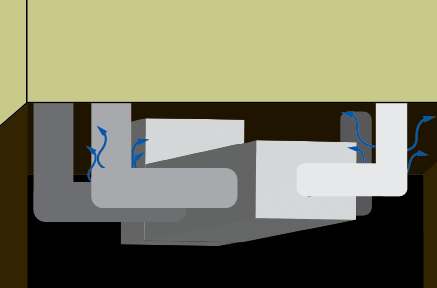What is the Most Energy Efficient Home Cooling System?
If your electricity bill after a summer of running your air conditioner scares you, then it might be time to consider a different home cooling solution. If you are trying to save money on your energy bill, then you might wonder what the most efficient home cooling system is or, at least, what is a more efficient system?
There are a ton of factors that impact the efficiency of your cooling system. That’s a reputable HVAC contractor will do a load calculation first. However, if you just want the raw numbers, then we can break those down objectively. Keep in mind that the actual performance of any HVAC equipment will vary based on the installation of the equipment, local climate, and design of your home.
To break it down in simplest terms, the most efficient system is the one with the highest SEER that uses a long activation cycle and does not suffer efficiency loss. In most cases, that will be a mini-split.
In this post, we’ll explain how this piece of equipment is the most efficient on paper and also explain some things that impact the actual efficiency you’ll experience at home.
What is SEER?
The first thing we need to get familiar with is SEER. SEER stands for Seasonal Energy Efficiency Ratio. Basically, it’s how we compare equipment that cools homes. If a device has a higher rating, that means it uses less energy than a device with a lower rating.
So when looking for a system that is highly efficient at cooling our homes, we want to look for a system with a high SEER rating.
What is the Most Efficient?
So without looking at the layout of your home, flat numbers, what system has the highest SEER and the least efficiency loss?
A Mini-Split Air Conditioner
Mini-split systems, as it stands, are the most efficient home cooling system on the market.
Does that mean that they are always the right answer for you? No. There’s a lot of variables in your home and lifestyle that need to be considered before you can know what system is your best option.
However, on paper, a mini-split system going to use less energy to produce cool air than any other comparable system. You can get an home air conditioner that will work with the same efficiency but it will be in a very different price bracket.
So what are the key points that make a mini-split so efficient?
- No Duct Loss
- Inverter Compressor
- Zoned
Duct Loss
Mini-splits are ductless systems. That means that the air handler that pumps air into your house is also cools the air.
In a traditional system. Air would flow to and from a central air handler through a series of ducts. Even with insulation, your system will lose cool air as it travels between the air handler and the vents in your home.
You don’t experience that efficiency loss with a mini-split.

Inverter
Most, if not all, minis-splits on the market today are inverter models. That means that they don’t just turn off and on, but can run at a variable speed for a longer period. HVAC equipment uses significantly more energy to turn on than to stay running. By running at a slower speed for a longer period, Inverter HVAC equipment can use far less energy than a traditional AC to keep your home cool.
An Inverter AC can also be connected to an existing ducted system as an upgrade so long as the furnace is also a communicating piece of equipment.
Zoned
Mini-split systems are entirely zoned. One outdoor unit can connect to up to four indoor units, which can each be controlled separately. That means that you can divide your home up into multiple zones, which can each have their own settings and each have their own thermostat in their air handler.
You don’t have to worry about a central air conditioner over-cooling areas of your home. You also don’t need to waste energy cooling rooms you are not using. That means that a mini-split is also more efficient than a traditional system because it does not pump more cold air into individual areas of your house than they require.
How do You Make Your Home More Efficient?
Of course, having the most efficient home cooling system does not make your home the most efficient. It is entirely possible to get the best equipment and still end up spending a decent amount of money on cooling because your home cannot be cooled efficiently.
That’s why we recommend looking at a whole home approach when designing HVAC systems. We want to design a solution that matches your situation and can actually help you realistically achieve your goals.
Each one of these factors below can affect your home’s cooling efficiency:
- Ventilation: Is your home properly ventilated and are those vents in good shape?
- Insulation: Is your home properly insulated or is it leaking air outside?
- Windows/ Doors: Are your windows are doors allowing a large amount of heat in?
- Shading: Is your home under natural shade or does it need to compensate for receiving direct sunlight?
- Airflow: Does your home trap air in corners or rooms to create air pockets that are too hot or too cold?
More information on how each of these factors affects your home can be found here.
A good HVAC Sales Professional should consider all these variables when suggesting equipment. A good HVAC system is designed to work with someone’s home. You can’t just slap a random high profit-margin system on every home and call it a day.
Who Are Advantage Heating and Air Conditioning, LLC?
We are your local HVAC Experts out of Salem, Oregon. We hope that this post gave you the information you need to make a confident decision when purchasing an efficient home cooling solution. If you have other questions about HVAC systems, check out our other blogs. To learn more about who we are and how we can help you, visit our website and follow us on social media – we’re here when you need us!







